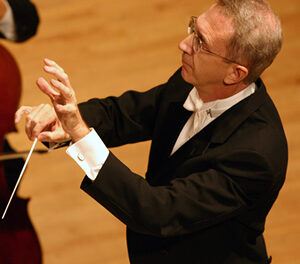Quick now, what composer comes to mind when you hear the expression, “Missa Solemnis?” If you came up with anyone in addition to Beethoven, then you really know your liturgical music. Or perhaps you were simply in attendance for the latest presentation by the Hillyer Community Chorus in the grand old downtown Hillyer Memorial Christian Church. There, the church’s own Bill Rashleigh led the chorus with orchestra and soloists in Mozart’s Mass in C minor (K. 139), one of several non-Beethoven works sometimes referred to as Missa Solemnis. In so doing, the musicians solemnized a bright spring Sunday afternoon.
A quartet of highly rated soloists contributed mightily to the Mass. Soprano Patricia Philipps was sparkling in the “Quoniam tu solus sanctus” from the Gloria, and especially in the brief Benedictus. She joined rich-voiced mezzo Jennifer Myers in a brilliant rendition of “Laudamus te,” again from the Gloria. The two constituted a most engaging duo in “Et incarnatus est…” from the Credo. Tenor Bradley Yoder and baritone William Adams took splendid solo turns in the Gloria. The former brought a silky tenor to “Domine Deus,” and the latter’s powerful low register carried the “Domine Fili unigenite” in fine style. And it is a pity that Mozart did not write the “peccata mundi” quartet with just a bit more length, so grand was the work of these four in the closing lines of the Mass.
The thirty or so chorus members seemed well-rehearsed and comfortable with the challenging music (composed by a twelve-year-old Mozart!). The orchestra of some sixteen instruments contributed significantly to the overall “pro” effect. The players were particularly effective as they ushered in the grim and foreboding “Crucifixus” scenes.
After intermission the gears and the mood changed completely. Players and soloists filed out, leaving the singers, director and pianist Bill Shelton. These forces gave a fine account of The Testament of Freedom, a four-part suite of songs by Randall Thompson, employing texts from the writings of Thomas Jefferson.
The text of the opening song dates from 1774: “The God who gave us life gave us liberty at the same time.” This notion recurs throughout the suite.
From 1775: “We have counted the cost of this contest, and find nothing so dreadful as voluntary slavery.” The insistent and martial drumbeat of Shelton’s piano added immensely to the spirit here. “Our cause is just. Our union is perfect.”
From 1775: “We fight not for glory of conquest [but] in defense of the freedom that is our birthright.”
From 1821: “I shall not die without a hope that light and liberty are on steady advance…The flames kindled on the 4th of July, 1776, [will not be] extinguished by the feeble engines of despotism…”
Singers and accompanist performed skillfully and with apparent enthusiasm on this work, one generally considered as not among Thompson’s finest when judged for purely musical content. But the piece exudes an aura that wraps hearer and performer alike in a reassuring blanket of homeland pride – patriotic zeal with no tinge of jingoism.











